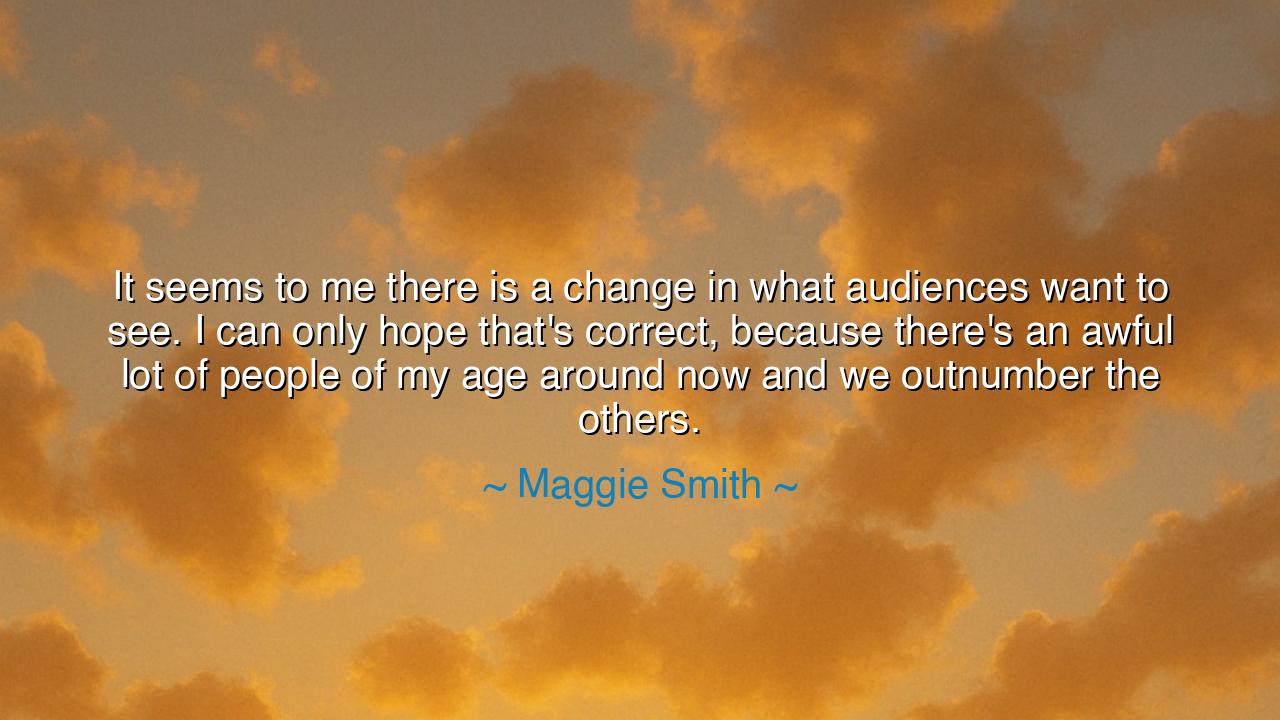
It seems to me there is a change in what audiences want to see. I
It seems to me there is a change in what audiences want to see. I can only hope that's correct, because there's an awful lot of people of my age around now and we outnumber the others.






The words of Maggie Smith—“It seems to me there is a change in what audiences want to see. I can only hope that's correct, because there's an awful lot of people of my age around now and we outnumber the others.”—carry the quiet strength of a woman who has lived through many seasons of art, fame, and transformation. They speak not only of cinema or theater, but of the changing spirit of time itself, of generations rising to reclaim their reflection in the stories of the world. Beneath her wit and restraint lies a profound truth: that age is not the waning of relevance, but the gathering of perspective. And when the world begins to hunger again for stories of wisdom rather than youth, it signals a turning of the great wheel—a moment when experience reclaims its voice.
When Maggie Smith speaks of “a change in what audiences want,” she is not merely observing fashion; she is sensing a shift in collective consciousness. For too long, the world of art, like the world at large, has worshiped the fleeting flame of youth—its beauty, its rebellion, its hunger. Yet the elder knows that after the blaze, one seeks the warmth of embers. Audiences, weary of glitter, begin to seek truth, and truth often wears the lines of age upon its face. Smith’s hope, half humorous and half prophetic, is that the world will finally remember that those who have lived long have also lived deeply, and that their stories are no less worthy of light.
In ancient times, this wisdom was revered. The Greeks honored Sophia, the goddess of wisdom, whose face was not that of a maiden but of a woman tempered by years. The Chinese spoke of the Sage, whose authority came not from might, but from harmony with time. In the courts of kings, gray hair was a crown of credibility. To grow old was not to fade but to ascend—to rise into the fullness of understanding. What Maggie Smith names—a shift in audience desire—is the same yearning that humanity always rediscovers: the longing to hear the voice of those who have endured, observed, and transformed.
Her words are also a reminder of the power of presence. Smith herself stands as a monument to resilience. Through decades of changing tastes and fleeting idols, she has remained—a master of her craft, whether as the fierce Violet Crawley in Downton Abbey or the wounded yet regal Miss Shepherd in The Lady in the Van. She has carried age not as a burden, but as armor polished by experience. Her hope for audiences is thus both artistic and human: that they might look beyond youth’s surface brilliance and see the radiance of endurance, the beauty of truth spoken from a life fully lived.
There is in her statement a gentle defiance, the kind known to those who have watched the tides turn many times. “We outnumber the others,” she says, not as boast but as revelation. The older generations, long made invisible by the glare of modernity, still form the heartbeat of society. They are the keepers of memory, the teachers of endurance, the ones who have weathered both triumph and tragedy. Smith’s words call to the elders: stand tall, for the time has come when the world begins to listen again. And they call to the young as well: do not turn away from age, for in its gaze lies your own future reflected.
Consider the story of Sophocles, who, at over ninety years of age, was accused by his own sons of senility and unfitness to manage his affairs. Rather than argue, the old playwright stood before the Athenian court and read a passage from his newest tragedy, Oedipus at Colonus. When he finished, the judges wept and acquitted him at once. “Would such words come from a feeble mind?” they said. Like Maggie Smith, Sophocles proved that the creative fire does not fade with age—it refines. His victory was not just personal but universal: proof that those who continue to create, to speak, to act, defy time itself.
So let this be the lesson: Do not surrender your voice to the silence of age, nor dismiss the wisdom that age brings. If you are young, listen to those who have walked farther than you; their words are the maps drawn in the dust of time. If you are older, do not shrink from the stage—whether it be in art, work, or life—for your story is the bridge between generations. The world’s appetite may shift, but truth never goes out of fashion, and truth is the domain of those who have endured.
In the end, Maggie Smith’s quote is not only about changing audiences—it is about the rebirth of reverence for experience. When she says “we outnumber the others,” she speaks as the voice of all who have lived long enough to see beauty redefined. For time does not steal from those who live fully; it gives them authority, it sharpens their vision, it deepens their art. So take heart, for the wheel turns again, and as it turns, it reminds us that to age with grace is not to fade—but to finally be seen for who you have always been.






AAdministratorAdministrator
Welcome, honored guests. Please leave a comment, we will respond soon